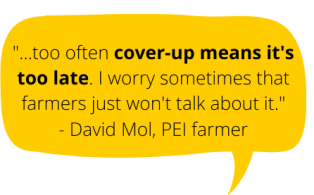Farming can be stressful. There are many uncontrollable factors, such as unpredictable weather, variable market prices, machinery breakdowns and animal welfare.
It's important for farmers, and those who support them - family members, friends, and trusted community members - to recognize the signs of chronic stress and the signs of suicide and to know where to go for help.
Signs of chronic stress
Chronic stress is often described as a feeling of being overwhelmed, worried or run-down, that is persistent or constant over a period of time. Chronic stress can impact your physical and mental health1 with increased risk of heart disease and stroke, depression, and anxiety.
It is important to recognize the signs of chronic stress and to take steps to manage it. The Canadian Mental Health Association provides an online questionnaire to help assess a person's level of stress.
Signs of suicide
A person with thoughts of suicide will often show these signs:2
- threatening to hurt or end their life, or talking of wanting to hurt or to end their life; and/ or,
- looking for ways to end their life by seeking access to firearms, available pills, pesticides, or other means; and/or,
- talking or writing about death, dying or suicide, when these actions are out of the ordinary.
If you notice these warning signs, seek professional help as soon as possible.

Other warning signs
- increased substance (alcohol or drug) use
- no sense of purpose in life
- anxiety, agitation, unable to sleep or sleeping all of the time
- feeling trapped - like there's no way out
- hopelessness
- withdrawal from friends, family and society
- rage, uncontrolled anger, seeking revenge
- acting reckless or engaging in risky activities, seemingly without thinking
- dramatic mood changes
- giving away prized possessions
Risk factors
- Having more than one of these warning signs is associated with greater risk of suicidal behavior.
- Losses and other events - whether anticipated or actual - such as financial damage, animal/herd loss, or a farm accident, for example, can lead to feelings of shame, humiliation, or despair and may serve as a triggering event for suicidal behavior.
- Previous suicide attempts - Anyone with a history of self harm or a past suicide attempt is at increased risk for another attempt or suicide. If you know of a previous attempt, pay attention to warning signs.
- Experiencing delusions, hallucinations and/or other psychotic symptoms is a risk factor for suicide.
Suicide is preventable. Help to promote life and living.
What You Can Do
If you think someone might be having suicidal thoughts, try to remain calm. Here's what you can do:
- Call the Island Helpline at 1-800-218-2885 day or night, any day of the year. A trained professional can help you decide what to do.
- Keep the individual safe. Do not leave a person alone who is in distress.
- Ask the question - Do you want to end your life? Research shows that asking this question directly can give the person a chance to talk and be comfortable with a difficult topic. Asking the question and talking about suicide will not lead to suicidal behavior. Oftentimes, suicide is not about death - it is about stopping emotional pain. Many would choose to live if they could find another way to deal with the situation. You can be available for support and to help the person make connections to help.
- Do not judge. Focus on messages of hope.
If the person says “yes,” ask if they have a plan. If they do, ask if they have the means to carry out the plan. (For example, if someone says he plans to shoot himself, find out if the person has access to a gun. If it is safe for you to do so, remove the firearm from the farm or home).
For each “yes” to this question series, the person is at greater risk of completing suicide.
- Encourage the person to call the Island Helpline for help to deal with suicidal thoughts. Stay with the person as he or she talks to a counselor.
- Help make a connection. Ask the person who they trust to talk to about this. If they cannot come up with someone, you could make suggestions such as a therapist/counselor, family member, friend, or faith leader. Help make a plan to reach out to that person.
Firearms
Many farms have a firearm on site. If you can do so safely, firearms should be removed from the home, or secured with trigger locks and stored in a gun safe that is not accessible to a person at risk.
It is important to remember that suicide is preventable and you can help! Use hopeful messages that promote life and living.3
For more information, visit Centre for Suicide Prevention and Canadian Association for Suicide Prevention
